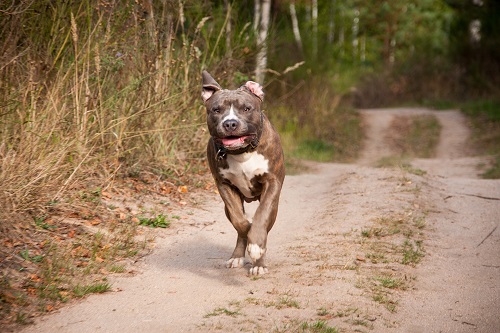Few breeds are as loving, loyal, and perennially misunderstood as the noble Pit Bull. Though these sturdy canines were once affectionately referred to as “nanny dogs” due to their gentle nature around children, negative media coverage has unfairly cast them as a problematic breed. While it’s absolutely true these dogs are both strong and stubborn without the proper training, there is nothing inherently vicious or unsafe about them. In fact, as any Pit Bull lover will be quick to mention, Pit Bulls’ ‘bad’ reputation is a recent – and inaccurate – convention.
So, the question may remain for some folks unfamiliar with the breed: are Pit Bulls dangerous? The short answer is that no, a Pit Bull that has been properly raised, neutered, and socialized doesn’t pose any more inherent threat than the next dog breed. To put it simply, any dog has the potential to be a dangerous animal in the wrong situation.
Generally, attacks among all breeds emerge as the “perfect storm” of issues:
- An unsocialized dog that hasn’t been fixed or neutered
- A stranger or threatening person in a dog’s territory
- A history of abuse with the dog as well
 In these cases, the dog – Pit Bull or not – is acting on the instinct of an animal, not some fixed set of genetically-inscribed motivations. The same combination of factors in a Dachshund, for example, wouldn’t pose the same risks: the dog is smaller, and can simply be avoided or moved out of the way if he lunges. Being that Pitties are bigger and less easy to sidestep, they end up saddled with an unfair reputation in the same fight-or-flight situation.
In these cases, the dog – Pit Bull or not – is acting on the instinct of an animal, not some fixed set of genetically-inscribed motivations. The same combination of factors in a Dachshund, for example, wouldn’t pose the same risks: the dog is smaller, and can simply be avoided or moved out of the way if he lunges. Being that Pitties are bigger and less easy to sidestep, they end up saddled with an unfair reputation in the same fight-or-flight situation.
Unfortunately, there are a variety of myths that have been invented to support the theory that a Pit Bull is ‘dangerous’ – that his jaws lock, that his brain swells in his head and makes him crazy – but these have all been systematically and medically exposed as pure wives’ tales as seen here. If a pet parent is equipped to handle and train a large, muscular dog safely in the home, a Pit Bull is as good of a choice as any other similarly-sized breed. In fact, Pit Bulls have been known to make wonderful family dogs and take to training quite well, as covered below in further detail.
The Pit Bull Personality: Loyal Companions
Ask a Pit Bull owner to sum up the personality of these doe-eyed hunks of muscle and one word will come up again and again: stubborn. When a Pit Bull is determined to get from point ‘A’ to point ‘B’, doors, door frames, baby gates, and other barriers can become collateral damage over time. Notorious “scratchers”, confining a Pit Bull somewhere he doesn’t want to be may result in gouges in the door or barrier as he tries to work his way out. Keeping his nails trimmed will help to minimize this damage, however, as will using a crate and being diligent about crate training your dog.
Pit Bulls are, unsurprisingly, enthusiastic chewers as well. That same happily lolling tongue and big maw will make short work of stuffed toys, and there are few things a chew-centric pit loves more than a new “stuffie” toy or a firm rubber Kong toy to gnaw on. Providing him with plenty of toys will keep any canine anxiety or boredom-based chewing confined to “approved” items, rather than the top of a baby gate or a table leg.
Good behaviors established in puppyhood will continue throughout his entire life, so be sure to start training as early as possible and stay consistent with expectations. Pit Bulls aren’t particularly hard to housebreak, especially if they’ve been spayed or neutered at the appropriate age to reduce the motivation to mark territory.
Pit Bulls are extremely loyal, and love nothing more than to be around their pet parent(s) on the couch or at their feet while they sit at a desk. So long as they have a toy or bone to keep them occupied and there are no noisy intruders outside, a Pit Bull makes the perfect rainy-day companion. When it comes to the Pit Bull temperament, they tend to be very playful and energetic when surrounded by the ones they love. Generally speaking, this breed has a strong desire to please their owners, making them very attentive and loyal family companions. All in all, the personality and temperament of the Pit Bull is protective, loving, and eager to please.
Walking & Exercising A Pit Bull
 Because of their strong, dense musculature, it can be hard to handle an adult Pit Bull on a traditional collar and lead during training. Training a Pit Bull isn’t necessarily hard, but it does require some persistence and patience. They can pull with impressive force, as some unwitting pet parents have found out the hard way when a squirrel darts by. Patient, positive-reinforcement training with treats and a harness or martingale-style collar can help mitigate some of his insistent pulling until he learns to behave well on his lead.
Because of their strong, dense musculature, it can be hard to handle an adult Pit Bull on a traditional collar and lead during training. Training a Pit Bull isn’t necessarily hard, but it does require some persistence and patience. They can pull with impressive force, as some unwitting pet parents have found out the hard way when a squirrel darts by. Patient, positive-reinforcement training with treats and a harness or martingale-style collar can help mitigate some of his insistent pulling until he learns to behave well on his lead.
Pit Bulls have a lot of energy, so they make excellent companions for an active pet parent. They provide safety while walking or jogging, and have the stamina to keep up on long strolls and runs. If a Pit is going on a long run, just be sure to bring along enough water for both canine and human to stay hydrated, and take frequent breaks to prevent overheating.
Dispelling The Myths: The Lovable Pit Bull Breed
Pit Bulls are an excellent, hardy, and healthy breed with some seriously bad public reputation myths holding them back. One of the biggest breed casualties of shelter overcrowding, adopting a Pit Bull often means saving his life – and he’ll spend the rest of it in the home as a loyal, entertaining and affectionate four-legged friend to his human companions.
Sources Cited:
- “American Pit Bull Terrier.” PetMD.com, (no publish date), https://www.petmd.com/dog/breeds/c_dg_american_pit_bull_terrier. Accessed September 23, 2019.
- “American Pit Bull Terrier Temperament Test Has Shocking Result.” Dogtime.com, (no publish date), https://dogtime.com/dog-health/general/1220-american-pit-bull-terrier-temperament-dog-bites. Accessed September 23, 2019.
- Worrall, Simon. “The Most Feared Dogs May Also Be the Most Misunderstood.” National Geographic.com, July 3, 2016, https://www.nationalgeographic.com/news/2016/07/pit-bull-ban-aggressive-dog-breed-bronwen-dickey/. Accessed September 23, 2019.




